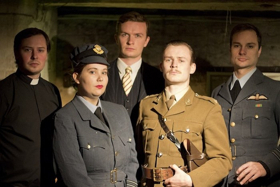Guest Blog: Director Owen Kingston On FOR KING AND COUNTRY

As any director will tell you, every show you work on has a special place in your heart. You cannot pour that much time and effort into something without developing a profound bond with it - for good or ill.
Every once in a while, however, a show comes along that is particularly special - more than the sum of its parts. Things don't just go well, they go far better than expected, and when this happens across the board, then you end up with a truly magical beast of a show - a unicorn, if you will - that fills you with joy whenever you think of it.
Working on For King and Country has been just such an experience. The show came about almost by accident - a chance encounter with some excellent game-theatre that provided the inspiration, the opportunity to use a space that fitted the period, and an alternate history concept inspired by some tabletop wargaming all collided in a beautiful explosion of creativity.
Game-theatre is not new, but where game mechanics are involved in performance they are usually acknowledged as such. Large strategy megagames tend to involve 'games masters' or 'umpires' in out-of-character roles who keep everything running smoothly and fairly.
Our company, Parabolic Theatre, is an immersive theatre company first and foremost, so if we were going to invest ourselves in a game-theatre show then two things had to be true: it needed to be driven by a story, and that story must pull the audience into a world that they could be fully immersed in. Game mechanics must be buried out of sight where they could not jolt anyone out of the world of the show.
This guiding principle has been adhered to at every turn. From the moment you set foot in our command bunker (a backup facility for the cabinet war rooms - not unlike Paddock in the real world), it is December 1940 and a Nazi invasion force has landed on the south coast.
Britain is in the midst of her very darkest hour. For the audience, the next two-and-a-bit hours are devoted to trying to repel that invasion, whilst simultaneously keeping the country running.
It is this experience of being thrust into the limelight and having the weight of the future of the country on your shoulders that has simultaneously intimidated and delighted audiences, offering them the chance to truly be the hero at a time where the stakes could not possibly be higher. It's an opportunity to walk in Churchill's shoes and make the big decisions - for good or ill - every one of which may win us or cost us the war.
It could also not be more timely. Our country is facing some massive, future-defining political decisions, and there is no consensus on which course of action is the right one to take.
It's easy to look back on the Second World War as a time of great political clarity, and while we can all be quite confident that Britain's opposition to the Nazi regime placed us on the 'right' side in the global conflict, the political decisions being made about how best to proceed in 1940, when Britain's resources were scarce and her options were few, only seem obvious now with the benefit of hindsight.
In an alternate history where the bullish and decisive Churchill is not Prime Minister, who can the country turn to in time of crisis? With German jackboots on British soil, who will step up to risk the country's future on the roll of a dice?
Will it be you, who dares to walk in the shoes of Churchill, and Thatcher, and Blair and May, and face the consequences of calling yourself Prime Minister?
For King and Country at Colab Factory 18 April-10 June
Comments

Videos

